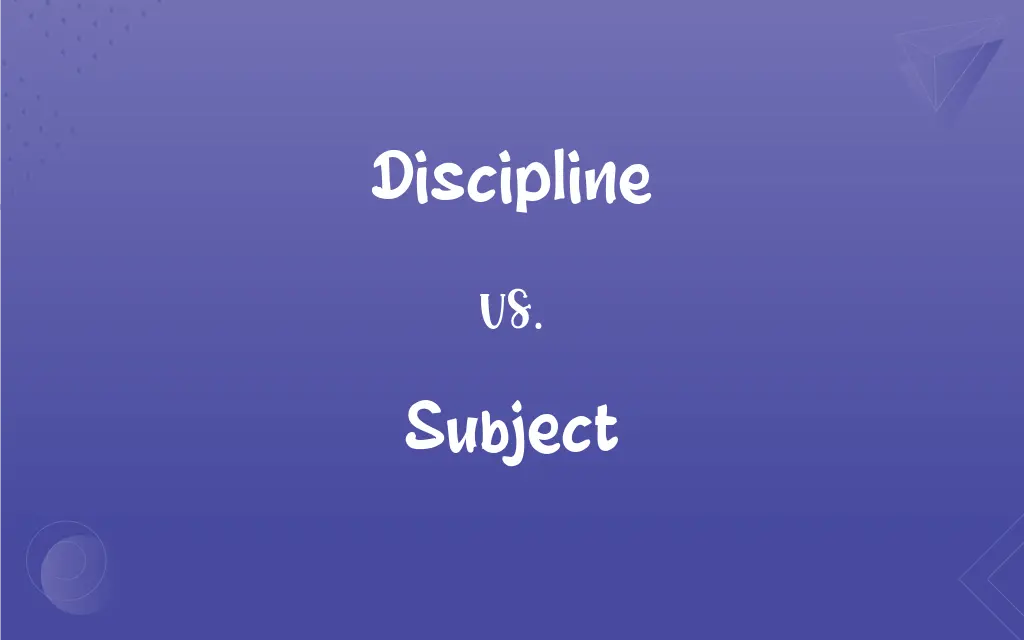Discipline vs. Subject: What's the Difference?
Edited by Aimie Carlson || By Janet White || Published on November 23, 2023
Discipline refers to a branch of learning or scholarly instruction, whereas subject is a topic or area of knowledge within a discipline.

Key Differences
A discipline is a broad field of study or a branch of knowledge, such as physics or literature, encompassing various subjects. A subject, on the other hand, is a specific area within a discipline, like quantum mechanics in physics or Romantic poetry in literature, focusing on more detailed aspects.
In an academic context, discipline represents an overarching category under which universities and educational institutions organize their curriculum, such as engineering or sociology. A subject, in contrast, refers to individual courses or topics within these broader disciplines, like civil engineering or social theory.
The development of a discipline involves establishing theories, methodologies, and frameworks that guide research and teaching. Subjects, however, delve into particular aspects or topics within these frameworks, exploring specific questions or themes.
Disciplines often define the scope and boundaries of scholarly inquiry and are associated with professional fields, whereas subjects represent the diversification of knowledge within these boundaries, allowing for specialization.
Disciplines provide a structural, comprehensive approach to learning and knowledge, whereas subjects offer focused, in-depth exploration within these broader fields.
ADVERTISEMENT
Comparison Chart
Scope
Broad area of study or learning
Specific topic within a discipline
Example
Mathematics
Algebra
Educational Structure
Forms the basis for academic departments
Constitutes individual courses or modules
Professional Relevance
Often aligns with specific professions
Provides specialized knowledge or skills
Research Approach
Defines overall methodologies and theories
Focuses on detailed, specific questions
ADVERTISEMENT
Discipline and Subject Definitions
Discipline
A regulated practice or exercise to develop a skill.
Regular practice is an important discipline for musicians.
Subject
The topic of a discussion, document, or artwork.
The subject of the documentary is climate change.
Discipline
Control gained by enforcing obedience or order.
Good discipline is essential in an army.
Subject
A person or thing that is being discussed, described, or dealt with.
I am the subject of her new novel.
Discipline
A way of behaving that shows a willingness to obey rules or orders.
Self-discipline is key to success.
Subject
A member of a state other than its ruler, especially one owing allegiance to a monarch or other supreme ruler.
Subjects of the British monarchy.
Discipline
A system of rules governing conduct.
The school imposes strict discipline on students.
Subject
A branch of knowledge studied or taught.
Mathematics is her favorite subject.
Discipline
A branch of learning or scholarly instruction.
She pursued a discipline in biology.
Subject
(Grammar) The part of a sentence or clause about which something is said.
In the sentence 'The cat sleeps,' 'the cat' is the subject.
Discipline
Training expected to produce a specific character or pattern of behavior, especially training that produces moral or mental improvement
Was raised in the strictest discipline.
Subject
Being in a position or in circumstances that place one under the power or authority of another or others
Subject to the law.
Discipline
Control obtained by enforcing compliance or order
Military discipline.
Subject
Prone; disposed
A child who is subject to colds.
Discipline
Controlled behavior resulting from disciplinary training; self-control
Dieting takes a lot of discipline.
FAQs
What's an example of a subject in the discipline of literature?
American poetry is a subject within the discipline of literature.
Can a subject be independent of a discipline?
No, a subject is typically a specific topic within a discipline.
Is 'mathematics' a discipline or a subject?
Mathematics is a discipline; it encompasses various subjects like algebra or calculus.
Can a discipline encompass multiple subjects?
Yes, disciplines often include a variety of subjects.
Can the same topic be a subject in different disciplines?
Yes, a topic like statistics can be a subject in both mathematics and sociology.
Can a subject become a discipline?
Over time, a subject might evolve into a discipline as it expands.
How do subjects contribute to academic diversity?
Subjects allow for in-depth exploration and specialization within disciplines.
What is a discipline in academic terms?
It's a broad area of study like biology or history.
What role does discipline play in education?
Discipline provides a structured framework for learning and research.
What does the subject mean in grammar?
It's the part of a sentence or clause about which something is said.
Can a person be a subject?
Yes, in terms of being a topic of discussion or study.
Can a subject be theoretical and practical?
Yes, subjects often have both theoretical and practical components.
Is discipline related to professional fields?
Yes, disciplines often correlate with specific professional fields.
How does a subject differ from a topic?
A subject is a broader category, while a topic is a specific aspect within it.
How do disciplines impact professional training?
They provide foundational knowledge relevant to specific careers.
Does the importance of disciplines change over time?
Yes, the relevance of disciplines can shift with societal changes.
Is every course at university a subject?
Essentially, yes, as each course covers a specific topic within a discipline.
Can disciplines overlap?
Yes, interdisciplinary studies often combine aspects of different disciplines.
Is the subject always academic?
No, it can also refer to topics in everyday discussions or various forms of art.
Are subjects static in their content?
No, subjects evolve with new research and perspectives.
About Author
Written by
Janet WhiteJanet White has been an esteemed writer and blogger for Difference Wiki. Holding a Master's degree in Science and Medical Journalism from the prestigious Boston University, she has consistently demonstrated her expertise and passion for her field. When she's not immersed in her work, Janet relishes her time exercising, delving into a good book, and cherishing moments with friends and family.
Edited by
Aimie CarlsonAimie Carlson, holding a master's degree in English literature, is a fervent English language enthusiast. She lends her writing talents to Difference Wiki, a prominent website that specializes in comparisons, offering readers insightful analyses that both captivate and inform.






































































